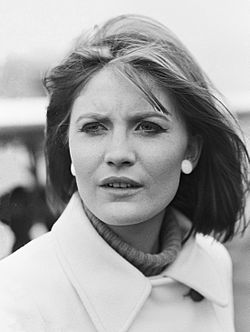I Don't Need Anything
| Sandie Shaw MBE |
|
|---|---|

Sandie Shaw in the Netherlands, February 1967
|
|
| Background information | |
| Birth name | Sandra Ann Goodrich |
| Born |
26 February 1947 Dagenham, Essex, England |
| Genres | pop |
| Occupation(s) | Singer, psychotherapist |
| Instruments | Vocals |
| Years active | 1964–2013 |
| Labels |
Pye Records Reprise Records (U.S.) Palace Records Polydor Records Virgin Records EMI Records |
| Website | Official website |
Sandie Shaw, MBE (born Sandra Ann Goodrich; 26 February 1947) is an English singer. One of the most successful British female singers of the 1960s, in 1967 the song "Puppet on a String" performed by her became the first British entry to win the Eurovision Song Contest. After a long and successful career, Shaw announced her retirement from the music industry in 2013.
Sandra Ann Goodrich was born and brought up in Dagenham, Essex, England. On leaving school, she worked at the nearby Ford Dagenham factory, and did some part-time modelling before coming second as a singer in a local talent contest. As a prize, she appeared at a charity concert in London, where her potential was spotted by singer Adam Faith. He introduced her to his manager, Eve Taylor, who won her a contract with Pye Records in 1964 and gave her the stage name of "Sandie Shaw".
Taylor teamed Shaw with songwriter Chris Andrews, who wrote her first single, "As Long as You're Happy Baby", which failed to make the charts. However, for her second single Taylor gave her the Bacharach and David song "(There's) Always Something There to Remind Me", which had been a No. 49 US pop hit for singer Lou Johnson. Shaw's version rose quickly to No. 1 in the UK Singles Chart in the autumn of 1964, and also charted in the United States at No. 52 on the Billboard Hot 100 early the following year.
"I'd Be Far Better Off Without You" was issued as the follow-up, but DJs preferred its B-side, "Girl Don't Come", also written by Andrews, and the sides were switched. "Girl Don't Come" reached No. 3 in the UK and became her biggest US hit, reaching No. 42. It was followed by further hits in the UK including "I'll Stop at Nothing", "Long Live Love", her second UK No. 1 in 1965, and "Message Understood". The singles were produced by Taylor, Andrews and Shaw herself (though she was never credited), with help from Pye Records arranger Ken Woodman.
...
Wikipedia
